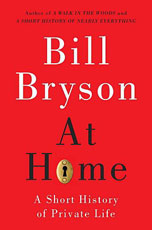Bill Bryson is a popular author whose book A Short History of Nearly Everything won the 2004 Aventis Prize. A little while after he and his wife moved to the village of Norfolk, England, this imaginative writer came up with the idea of touring each room in his house and composing "a history of the world without leaving home." As Bryson notes in the introduction, houses aren't refuges from history; they are repositories where history ends up. His house, a former Church of England rectory was built in 1850.
Bryson begins his exploration of his home with the hall where people used to drop off their outerwear. He notes that in the mid-nineteenth century, one of the biggest differences between the rich and others was the size of their halls. In his discussion of the kitchen, Bryson turns to meditations on bread, ice, a popular household management book, and the diet of Victorian people. This wordsmith takes pleasure in the "scullery" and "larder" where servant's labored diligently. A chapter on the fusebox leads to a consideration of electric lighting. Bryson sees the development of the drawing room as "the advent of comfort in the home." In his treatment of the dining room, there is an analysis of salt, spices, tea, and sugar. The author commends the habit of Victorians to get most of their calories at breakfast and lunch with only a small meal at dinnertime.
Other chapters cover a broad swath of historical material: a walk through the cellar prompts a lecture on bricks and iron; while in his study, Bryson surveys the intrusions of mice, rats, microbes, and bats; the bathroom leads to a history of hygiene; and, of course, the bedroom spurs him to comment about sex, sleeping, and death. After reading this fascinating book, you will want to think more expansively about your own house and possessions!
